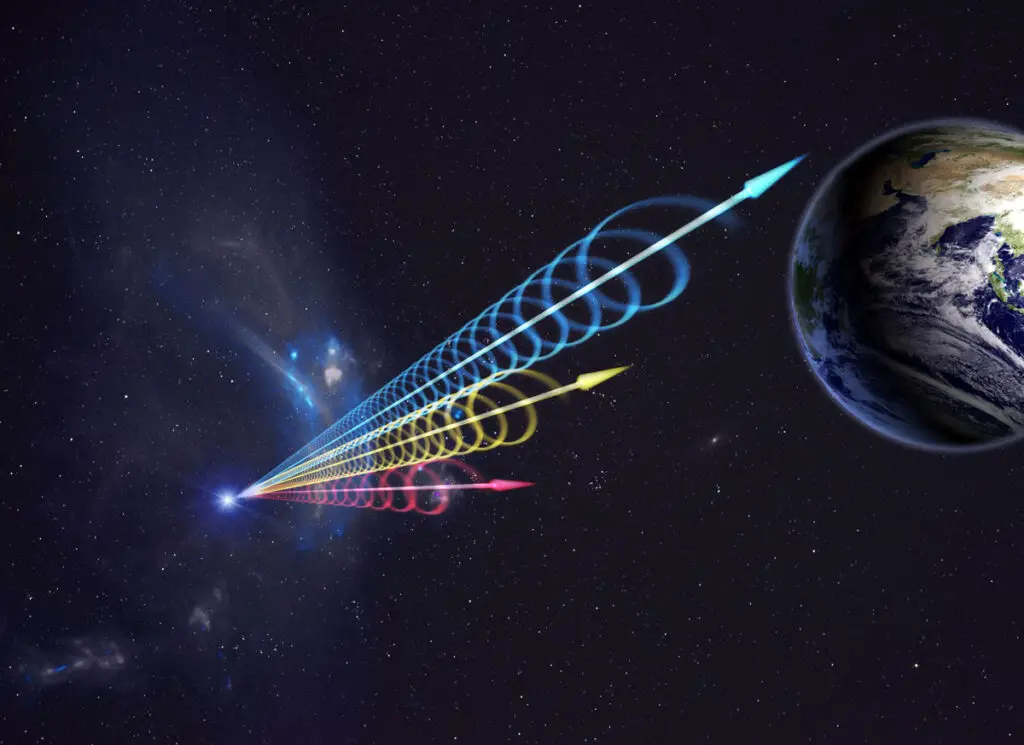Scientists have spotted a repeating radio signal from a nearby star system that hints at the presence of a magnetic field around one of its Earth-sized planets, reports a new study.

Earth’s magnetic field has played a critical role in the survival of life by shielding the surface from the Sun’s harmful radiation and helping to maintain a stable atmosphere that nourishes our biosphere. For this reason, scientists think that extraterrestrial life, if it exists, might also depend on the presence of robust magnetic fields around exoplanets, which are worlds that orbit other stars.
Scientists have previously observed the magnetic fields of giant Jupiter-scale exoplanets interacting with their host stars, as part of a process called magnetic star-planet interactions (SPIs). However, Earth-sized exoplanets give off much weaker magnetic signals compared to gas giants, making it difficult to detect magnetism around rocky worlds.
Sebastian Pineda, a research scientist at the University of Colorado, Boulder, and Jacqueline Villadsen, an assistant professor at Bucknell University, have spent years searching for these elusive signs of magnetic fields around small planets. Now, the pair of astronomers present unprecedented evidence of repeated radio bursts that may be linked to a magnetic field around the Earth-sized exoplanet YZ Ceti b, which is located just 12 light years from our solar system.
YZ Ceti b completes an orbit in just two days, which means it is way too close to its star to host life, but this ultrashort year also “makes it a uniquely promising case study for magnetic SPIs,” according to a study published on Monday in Nature Astronomy.
“It was super exciting to see the radio data sets show this kind of signature,” Pineda said in an email to Motherboard. “We saw the initial burst detection, and immediately went about coordinating observations for additional monitoring, based on the published planet period, since we were looking for something that happens at the same time in the planet’s orbit.”
“Once we had the additional data, Jackie was looking at it, and was telling me: ‘hey, there are similar radio signals here, right when we were looking and hoping to see them,’” he continued. “It was a bit of feverish excitement: ‘wow, we may really have it here!!’ I’m pretty sure I started pacing around, imagining our next steps: alright, we’ve got work to do to really demonstrate this result, with all the implications etc.”
In their hunt for these signals, Pineda and Villadsen focused their attention on short-period small planets, because they might have a more visible magnetic signature as a result of their proximity to their stars. As these worlds hurtle through their orbits, any magnetic field they might possess could interact with the star’s own magnetic field, creating a pattern of radio bursts from the star that can be potentially seen here on Earth.
The researchers think they might have seen these repeat bursts from the YZ Ceti system, but they caution that it’s not a slam-dunk case. It’s possible that the signals are a normal part of the radio stellar activity of stars like YZ Ceti, which is a slowly rotating red dwarf, which would mean that its emission may have nothing to do with any planets in the system.
“There are still too many unknowns about the system, but I’d say we are demonstrating the potential of radio data and magnetic star-planet interactions to lead toward measurements of Earth-sized exoplanet magnetic field strengths—I don’t think we’re really there yet,” Pineda said.
“So, we want to continue to monitor the star with the radio observatories, and look for additional recurrence of the radio signals that occur periodically with the same position of the planet in its orbit,” he added. “It can be time consuming and a bit challenging to set up, but that’ll confirm that the radio detections are indeed dependent on the planet, and not something that the star is doing on its own.”
If this does turn out to be the first detection of magnetic SPI around an Earth-sized exoplanet, it could help scientists hunt for habitable worlds in other stars. The caveat is that looking for magnetic signatures around rocky worlds in the habitable zones of their stars, where liquid water and life are considered more likely to exist, would be tricky because these planets have much larger orbits. This distance from stars may be an advantage for any hidden aliens out there, but it also makes the magnetic interactions between stars and planets far weaker, to the point that some may not be detectable at all.
However, the new study offers a potential example of the types of signals you might expect to see from a system that contains a magnetically shielded planet that is similar in size to Earth. With time and practice, scientists might be able to zero-in on interesting targets, Pineda said, as part of a wider approach to assessing the odds that life might exist on other worlds.
“First off, fully confirming magnetic field strengths on exoplanets is a requisite for any broader understanding of habitability,” he explained. “It’s not just a temperature question, but the whole star-planet system needs to be thought about holistically, with magnetism as an important ingredient.”
“So, if we know these exoplanets have magnetic fields from the SPI work, we can start to think about questions like what are the properties of those planets, and thus how do the habitable zone planets compare, and what are the chances that they too have similar magnetic fields, even if we can’t measure them yet for the [habitable zone] planets specifically,” Pineda concluded. “If you can infer then that a planet likely has its own field, that’s when you can start thinking about whether individual planets are truly hospitable.”